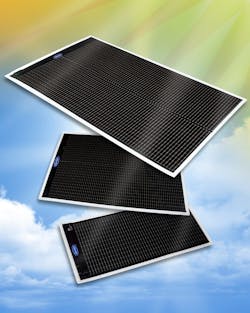Carrier Transicold expands its thin solar panel line
Carrier Transicold has expanded its line of Thin Film Flexible Solar Panels designed to help maintain performance of transport refrigeration unit (TRU) batteries in a more environmentally sustainable way. Carrier Transicold is a part of UTC Climate, Controls & Security, a unit of United Technologies Corp.
Carrier Transicold now offers 18.5 watt (1.2 amp) and 9.24 watt (0.6 amp) solar panels, in addition to its original 28 watt (1.8 amp) panel, accommodating a wider range of user needs and budgets. The solar panels are designed specifically to maintain TRU battery charge and can be easily installed on the roofs of trailers, truck bodies and refrigerated rail cars chilled by Carrier Transicold or other systems.
Solar panels can offset the draw from accessory electrical devices, significantly reducing callout charges related to the battery. Solar panels can also help conserve fuel by minimizing the need to run the TRU engine to charge the battery.
“Our amorphous silicon, or a-Si, solar cell technology provides high performance in real world environments where daylight may be indirect or low,” said Jason Forman, marketing manager, performance parts, Carrier Transicold. “Unlike some other solar technologies that require several days of sun soaking to bring the panels up to full functionality, a-Si panels deliver maximum performance without sun soaking. They also begin charging at a higher voltage at a lower angle of light than some other technologies, allowing charging over a longer portion of the day, which is especially helpful in northern regions and in the winter.”
“Fleets located farther south in warmer climates will appreciate that a-Si panels do a better job of retaining their efficiency on hot days, in contrast to some other types of solar panels that can lose considerable efficiency when their temperature increases,” he added.
